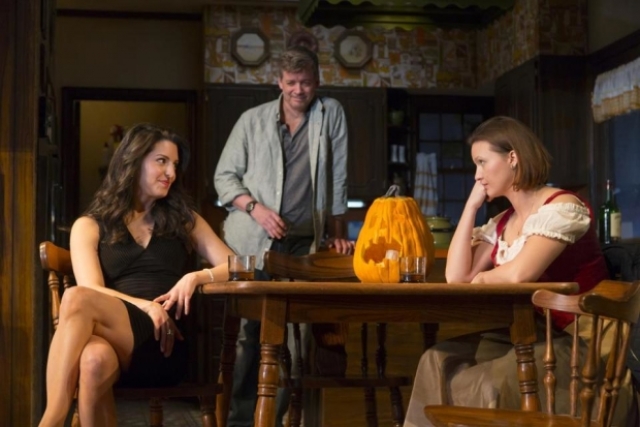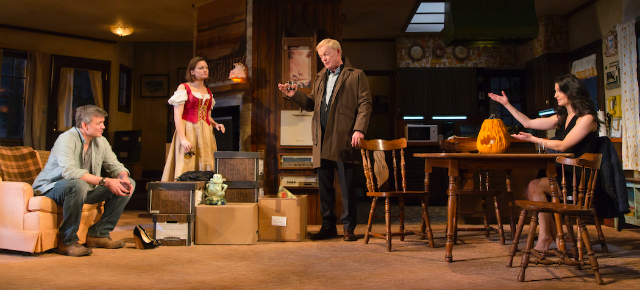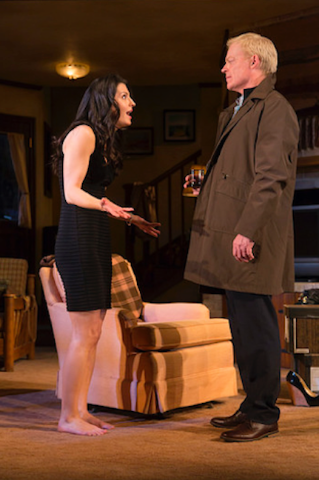Can You Forgive Her At Huntington Theatre
A Social Comedy About Making Mistakes at the Calderwood
By: Mark Favermann - Apr 12, 2016
Can You Forgive Her?
By Gina Gionfriddo
Directed by Peter Dubois
At the Huntington Theatre's Calderwood Pavilion
Through April 24th
One hour and forty minutes in one act
This play is a contemporary social comedy about bad choices made after early great expectations. Set in an old fashioned beach bungalow somewhere on the East Coast (Jersey Shore or Cape Cod?), the play starts out with a very awkward, no actually stilted conversation between a suffering but disengaged younger woman and a self-absorbed middle age man--Tanya (Tanya Fischer) and Graham (Chris Henry Coffey). Both are certifiable losers. Neither one has come close to grabbing for life's golden ring.
An uninspired and impoverished bartender, Tanya is dressed as a middle ages' serving wench, and the wanting to please puppy Graham is clad in a seemingly disparate love for Tanya. She wants to uplift herself through a self-help book and wants Graham to get off his ass and either sort through or get rid of the multiple boxes of his late mother's (it is her house that he inherited) unhappy writings. She would like him to have real goals and even get a normal job as well. For some unknown reason, he just wants her. Did I say that the play starts out very slowly?
Unfortunately, Tanya is way too mousey, while Graham is much too non-directional. Painful may be a description of their discourse. Although playwright Gina Gionfriddo adds a comedic lick here and there in their dialogue, the audience does not seem to emotionally or even intellectually embrace either of the two characters. It is confusing what the appeal is to each other. We are much relieved when Tanya goes off to the late shift at the bar, and there is a fade to black.
The second act is like a huge wave hitting the shore after a boring calm grey day. With great force, Miranda is the wave brutally arriving at the beach cottage like the aftermath of a hurricane. She has been whisked away from a bad altercation at Tanya's bar by Graham. He is her temporary knight in shining armor; she is much less than a damsel in distress. Though rather unbelievable, Miranda is the only character who has any life-force in the play. Elegant and sexy in her simple black dress, she is raucous, profane, racist and totally mercenary. And these may be her best qualities. Self-loathing, gold-digging and selfish may be more to Miranda's point.
Her backstory is as a stepchild of upper class upbringing in tony Newport, RI that led to a disconnect and disinheritance at age 18. She was overwhelmingly impoverished by going to Brown University and later NYU through student loans ($200K). The whole thing is fishy in that her sudden poverty could have easily resulted in Ivy League need-based scholarships. So according to the narrative, after being a failed school teacher, she became a money for sex and companionship mistress to wealthy older men. One in particular, an older conservative doctor, is David, who she has followed to this beachside community is paying her bills. She may even love him. The father figure aspects of this are heaped very high.
She has used her teasing beauty to have a computer nerd from India drive her here and to lavish gifts upon her. Sateesh is the one she had the altercation with at the bar. He was so upset that he said that he would kill her. Telling this convoluted story to Graham and trading glasses of whiskey with him, at times it seems more monologue than dialogue. Gionfriddo seems to like to use full sentences or two or even three instead of a few words to make seemingly laborious points. The character Miranda is hardly believable. Is she a prostitute made of earthy clay or a phony courtesan playing down market? Her use of language, underclass bile and indifferent demeanor do not suggest an intellectually-driven Brown grad. This is an odd characterization that could have been very thoughtfully layered, but wasn't. This is not to say however that the actress playing her is anything but terrific. Meredith Forlenza is the sparkling if not appealing star of the production. Unfortunately, she was not directed to somehow more skillfully play against shrill type.
Tanya gets off work and Sateesh (Theo Tyler) as well as David eventually show up at the bungalow. Do we really care what happens to these rather flat, cartoon characters? The playwright and Director Peter DuBois allow the performers to emote individual attitudes with little or no nuance. Allyn Burrow's David is allowed to strike a few notes of wry comedic insight even if his character would not have probably understood them. Surprisingly for the Huntington, the unlovely set is a location without a sense of real place.
This is a show badly in need of editing. It does contain sex, money and selfish behavior, but the playwright's dark humor must contain and inform more. And certainly 90 minutes would be enough time to tell this story. So would more irony and less blatant editorializing. The Huntington Theatre Company should be commended for premiering new plays, but because something is new doesn't make it always at the very least even good.





